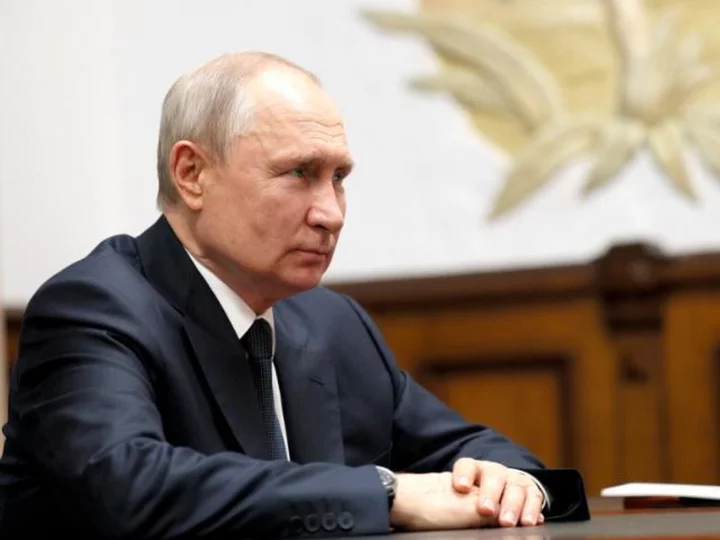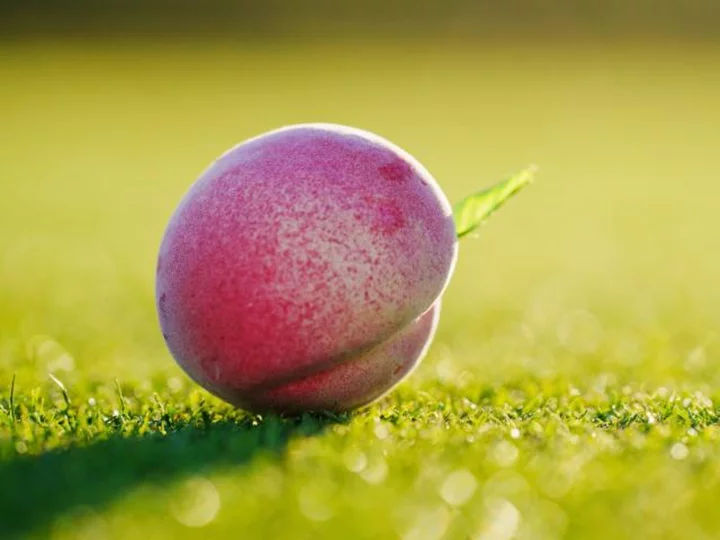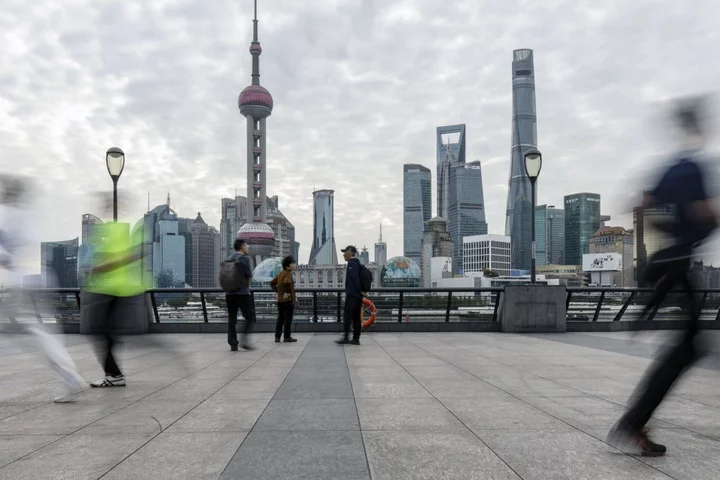Russian President Vladimir Putin just reminded the world that he has the capacity to apply pain far beyond the excruciating torment he's inflicting on Ukraine.
Russia's suspension of a deal allowing the export of Ukrainian grain from a region fabled as the world's bread basket threatens to cause severe food shortages in Africa and send prices spiraling in supermarkets in the developed world. In the United States, it represents a political risk for President Joe Biden, who is embarking on a reelection campaign and can hardly afford a rebound of the high inflation that hounded US consumers at its peak last year.
Russia's decision looked at first sight like a face-saving reprisal for an attack claimed by Ukraine on a bridge linking the annexed Crimean peninsula to the Russian mainland. The bridge was a vanity project for Putin and the apparent assault represented another humiliation for the Russian leader in a war that has gone badly wrong.
The Black Sea grain deal, agreed last year and brokered by Turkey and the United Nations, was a rare diplomatic ray of light during a war that has shattered Russia's relations with the US and its allies and has had global reverberations.
By refusing to renew it, Putin appears again to be seeking to impose a cost on the West, in return for the sanctions strangling the Russian economy. He may reason that a food inflation crisis might help splinter political support in NATO nations for the prolonged and expensive effort to save Ukraine. And grain shortages afflicting innocent people in the developing world could exacerbate international pressure for a negotiated end to a war that has turned into a disaster for Russia.
The West slams Putin for using food as a 'weapon'
The United States and other Western powers reacted to Russia's announcement that the deal had been "terminated" with outrage, mirroring Ukrainian President Volodymyr Zelensky's warning that Putin was trying to "weaponize hunger."
Secretary of State Antony Blinken warned that Russia was trying to use food as a tool in its war on Ukraine, adding that the tactic would make "food harder to come by in places that desperately need it and have prices rise ... The bottom line is, it's unconscionable. It should not happen."
Singling Russia out as a moral transgressor might be understandable given the horror it has visited on Ukraine and may rally fury over Putin's move in the West and the developing world. But humanitarian arguments won't sway a Russian president who launched an unprovoked onslaught on a sovereign neighbor and is accused of presiding over brutal war crimes.
Still, Russia's rhetoric after canceling the deal and the reactions from key players elsewhere in Eurasia suggest that the agreement may not be quite as terminated as the Kremlin claims. There's a chance Putin sees a grain showdown as a way to improve his dire position.
Turkey is in the middle of another diplomatic intrigue
In a clear sign of diplomatic maneuvering, Russia justified its cancellation of the agreement by saying that it was not getting its share of the benefits. noting that it had faced obstacles with its own food exports. Kremlin spokesman Dmitry Peskov hinted, however, that Moscow might allow the return of exports from Ukraine's Black Sea ports once its objectives were achieved.
But UN Secretary General António Guterres underscored how difficult it might be to return to the deal with a categorical repudiation of Russia's points in a letter to Putin, arguing that under the agreement, the Russian grain trade had reached high export volumes and fertilizer markets were nearing full recovery with the return of Russian produce. Guterres said that he'd sent Russia proposals to keep the grain deal alive but that he was "deeply disappointed" that his efforts went unheeded.
The UN chief's comments reinforced a view that, for now, Russia sees a point of leverage in refusing to renew the Black Sea grain deal. The decision comes against a complicated geopolitical backdrop following last week's NATO summit at which G7, nations pledged to offer Ukraine the means of its self-defense for years to come.
It may also represent the latest chess move in a shady double game of great power geopolitics being waged by a pair of Machiavellian autocrats — Putin and Turkish President Recep Tayyip Erdogan, who are due to meet in August.
Erdogan won prestige and the gratitude of his fellow NATO leaders and developing nations for brokering the original grain deal. But he has angered Russia in recent days, despite keeping open channels with Putin during the war. It's conceivable the Russian leader could be sending a shot across the bows of his Turkish partner by canceling out his achievement.
Russia was infuriated last week when Turkey sent a group of captured Ukrainian military commanders back to Zelensky despite a previous agreement they would not go home until after the war. Erdogan also risked his relationship with Putin by dropping opposition to Sweden's entry into NATO, a move that significantly weakened Russia's strategic position in Europe.
But it was noticeable that Erdogan, who has a reputation for cannily playing his cards to enhance his own and Turkey's influence, referred to Putin as his "friend" on Monday and suggested that the Russian leader might want to keep the "humanitarian bridge" of grain exports open.
If he could somehow engineer a return to the deal, Erdogan could again bolster his place at the hinge of Eurasian great power politics. He'd also boost his goal of emerging as a leader among developing world nations and do a favor for Western leaders fearing an inflationary spike.
Michael Kimmage, who served on the policy planning staff at the State Department between 2014 and 2016 and is now a professor at Catholic University of America in Washington, argues that Turkey is in a unique position, since it possesses considerable leverage inside NATO but also has robust relationships with both Ukraine and Russia.
"I think it's very possible that even before the Putin-Erdogan meeting there could be a resumption of the grain deal because that keeps Russia to a degree in the good graces of the international community," Kimmage said.
Reviving the grain deal would show that Russia, in its isolation, retains some Turkish support, Kimmage added, but the episode also demonstrates to the rest of the world that "when Russia wants, it can turn off the grain deal and be an enormous pain in the neck in the Black Sea."
Russia's wider interests may augur an easing of the blockade
While the war in Ukraine has consumed Russia's foreign policy, Moscow has also made intense efforts to carve out its own influence in Africa and elsewhere in opposition to the United States. So it may risk damaging its own priorities by triggering widespread food shortages, especially since much of Ukraine's grain is used in World Food Programs to alleviate famine in Africa.
While the White House is fueling a sense of moral outrage over Russia's move, it quickly dismissed another potential response -- an attempt to bust a Russian blockade in the Black Sea.
"That's not an option that's being actively pursued," John Kirby, the coordinator for strategic communications at the National Security Council, said Monday in a comment that was in line with Biden's goal of avoiding any direct NATO clash with Russia, a nuclear superpower.
While the end of the grain deal would cause significant global hardship, its worst effects may be weeks away -- so there could be time for diplomacy to work.
Nicolay Gorbachov, the President of the Ukrainian Grain Association, told Isa Soares on CNN International on Monday that exports by road, rail and river could mitigate the most damaging effects of the collapse of the deal for two or three weeks, even if such transportation methods lacked the volume of shipborne cargoes.
But he also warned that ultimately, if Ukraine could not export its grain -- "all of us, in developed countries, in developing countries, will face food inflation."
"In my opinion, the international community, the developed countries have to find the leverage to move grain from Ukraine to the world market," he said.









